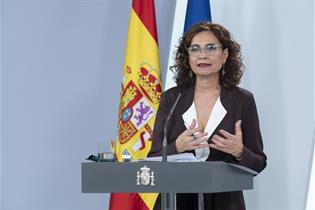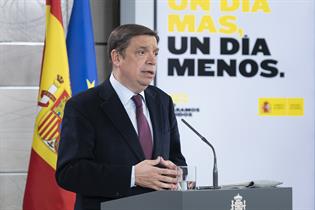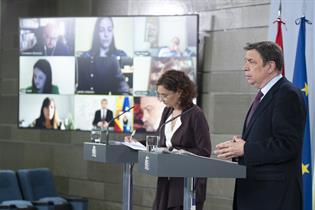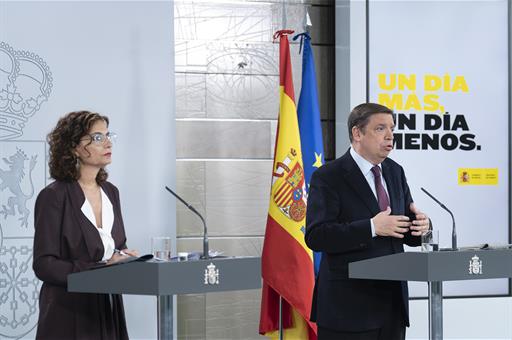Council of Ministers
Government to ask Lower House of Parliament to extend state of emergency to 26 April
Council of Ministers - 2020.4.7
The Council of Ministers agreed to ask the Lower House of Parliament for its authorisation to extend the state of emergency until midnight on 26 April originally decreed on 14 March in order to manage the health crisis caused by COVID-19.
The Minister for the Treasury and Government Spokesperson, María Jesús Montero, stated that the President of the Government, Pedro Sánchez, will appear before the Lower House on Thursday to defend this request which he trusts will be backed by most parliamentary groups.
The government wishes to open a framework of collaboration with all the political groups, business organisations, trade unions and regional authorities to tackle the pressing challenges and define the reconstruction of Spain when the pandemic is over, claimed the Government Spokesperson. With this aim in mind, María Jesús Montero also asked for public contributions and talent.
María Jesús Montero stated that the government considers it a priority to recover work when employees end their recoverable paid leave. In this regard, she highlighted that this measure has been "incredibly effective" and that the mobility figures show that the business environment has "faithfully complied with the intention expressed" in the legislation.
 Pool Moncloa/Borja Puig de la BellacasaThe government, stated the Government Spokesperson, will continue to monitor labour activity with the dual aim of "ensuring that workers can carry out their tasks safely and that the spread of the virus is controlled".
Pool Moncloa/Borja Puig de la BellacasaThe government, stated the Government Spokesperson, will continue to monitor labour activity with the dual aim of "ensuring that workers can carry out their tasks safely and that the spread of the virus is controlled".
The Government Spokesperson stressed that the lockdown measures are proving to be effective and thanked the public for their efforts, which is translating into lives saved and time gained so that the health system can be strengthened.
María Jesús Montero added that the government is working on different scenarios so that people can recover normality while maintaining their safety. As regards the possibility of introducing the widespread use of face masks, the minister said that the decision will depend on how the pandemic develops in the next few days.
Europe must protect its citizens
The Government Spokesperson claimed that Europe must seek an internal consensus to tackle the coronavirus crisis. In this regard, she positively welcomed the proposal made by the European Commission to set up an unemployment benefit fund, although she considers it necessary to adopt a form of Marshall Plan and reach an agreement on the Multiannual Financial Framework that contains a response to the health emergency.
María Jesús Montero confirmed that the government will advocate a new mechanism to mutualise debt at Tuesday's Eurogroup meeting, and that Europe should act as a bloc in its procurement of health products and structure a "powerful reactivation plan so that the recovery is quick, sound and fair".
The minister recalled that the President of the Government "clearly and firmly" told his European partners that this crisis must be transformed into an opportunity to rebuild a much stronger European Union, with ambitious measures because "we will fail if we don't think big".
Measures to foster employment and guarantee development of agricultural season
 Pool Moncloa/Borja Puig de la BellacasaThe government approved a Royal Decree-Law adopting urgent temporary measures on jobs in agriculture. Its aim is to ensure that enough workers are available to carry out seasonal work in the countryside and guarantee the supply of fresh products.
Pool Moncloa/Borja Puig de la BellacasaThe government approved a Royal Decree-Law adopting urgent temporary measures on jobs in agriculture. Its aim is to ensure that enough workers are available to carry out seasonal work in the countryside and guarantee the supply of fresh products.
The Minister for Agriculture, Fisheries and Food, Luis Planas, explained that these manual tasks - thinning, picking, collecting and handling fruit and vegetables - which last from spring through to the end of September, are normally carried out by temporary workers from other countries, both in the European Union and beyond. However, with the mobility restrictions due to the COVID-19 pandemic, this hiring possibility does not currently exist.
The minister predicts that if the seasonal agricultural work is not performed, the supply of products will drop, and a reduction in supply would lead to "undesired" price hikes. Furthermore, given that two thirds of the production is exported and that the traffic of goods continues to flow, "we must continue supplying these markets, which are also a major source of income for the agricultural sector and for Spanish society as a whole", he said.
The measures contained in the new legislation are aimed at making it easier to hire workers for the agricultural season. Firstly, remarked the minister, a criterion on proximity is established to limit travel, such that people who live in the same or adjoining municipalities will be contracted on a preferential basis. Secondly, it will be possible to hire workers that are receiving unemployment or other social benefits, and they will be allowed to combine receiving this "on an exceptional and extraordinary basis" with obtaining a wage for this farm work.
The only exception, specified the minister, will be those workers that receive an unemployment benefit tied to a temporary lay-off plan (Spanish acronym: ERTE) or a reduction in activity as a result of the current health emergency. "We consider that those situations related to the coronavirus should not be applicable in this context".
Accordingly, all those people who are unemployed can be hired, and those that receive a subsidy, agricultural income or unemployment benefit, if the right to receive this is not related to the measures approved due to COVID-19. As regards foreign workers, those that are legally resident in Spain and have a work permit that expires before 30 June will have this renewed, while this permit will be facilitated to young nationals of third countries aged between 18 and 21.
Luis Planas estimates that between 75,000 and 80,000 workers are needed, who could sign different back-to-back contracts during the season. Each work contract will be formalised in writing, with the salary established in the corresponding collective bargaining agreement or the minimum wage, which will be received by bank transfer.
Smooth functioning of agri-food chain
 Pool Moncloa/Borja Puig de la BellacasaThe minister added that the food chain is working correctly, and thanked crop and livestock farmers, fishermen, professional associations, agri-food cooperatives, industry companies and the agri-food distributors and all their professionals for their hard work.
Pool Moncloa/Borja Puig de la BellacasaThe minister added that the food chain is working correctly, and thanked crop and livestock farmers, fishermen, professional associations, agri-food cooperatives, industry companies and the agri-food distributors and all their professionals for their hard work.
Luis Planas highlighted the "normal" way in which supplies and shopping are taking place, since there has been a gradual reduction in the number of visits to shops and supermarkets. The figures on consumption in the third week since the declaration of the state of emergency have also shown an increase in the purchase of fresh products - meat, fruit and vegetables - compared with non-perishable goods in the first two weeks.
Non official translation





